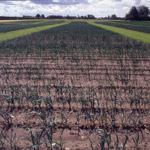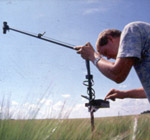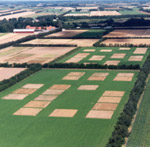|
Purpose and background
The Danish Research Centre for Organic Farming (DARCOF) was established in 1995 as a so-called "centre without walls" where the actual research is performed in interdisciplinary collaboration between the participating research groups.
The remit of DARCOF is to coordinate research for organic farming, with a view to achieving optimum benefit from the allocated resources. Its aim is to elucidate the ideas and problems faced in organic farming through the promotion of high quality research of international standard.
The remit of DARCOF
Development of research in organic farming
|

|
Central activities
As the coordinating organ for Danish research in organic farming, DARCOF must first and foremost ensure that the research system focuses on the most relevant challenges, that the projects are under-taken in the most appropriate manner, and that the various target groups are regularly informed of the findings. The tasks of DARCOF can therefore be split up into the following central activities.
Coordination
Education
Research methodology
Knowledge synthesis
Communication and mediation
|
 |
Organisation
DARCOF's researchers remain in their own research environment but collaborate across institutes. This type of collaboration currently implicates about 120 research scientists working at nearly 20 different institutes. DARCOF is led by a board of directors consisting of research leaders from the central research institutes. To ensure the relevance of its R&D activities, including contact with the various user groups, a user committee has been appointed with representatives from the central professional associations and NGOs.
Board of Directors & Users Committee
Participating institutes
|
 |
Facilities
During the first years of DARCOF's existence several unique research facilities were set up to provide an opportunity for conducting different projects simultaneously, using the same research fields, herds, etc. This allows close cooperation between different research environments, with a high degree of interdisciplinary collaboration, synergy, and complementary research. The main facilities are described below.
Organic workshop sites and Crop rotation trials
The organic research station Rugballegaard
The research farms at the Royal Veterinary and Agricultural University (KVL)
Farm studies
|
 |
|
|
|